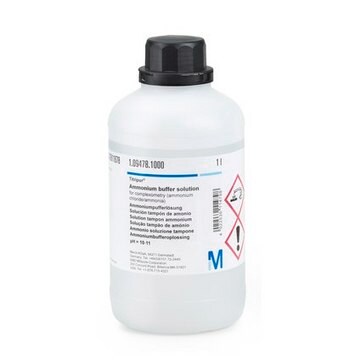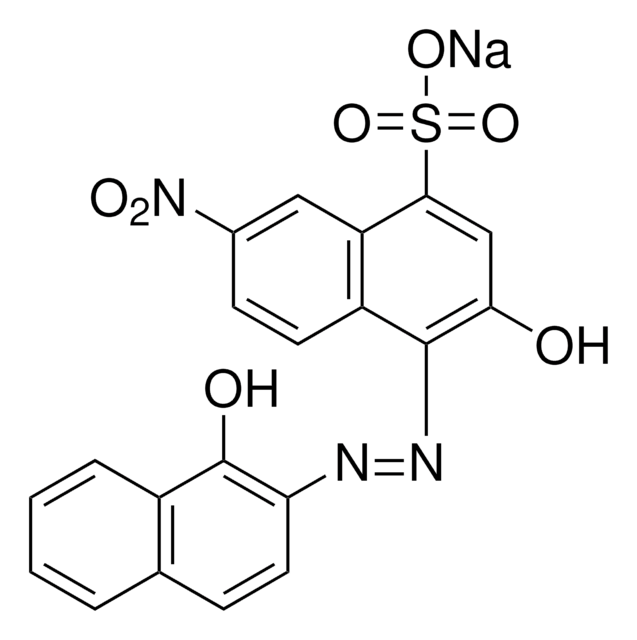318604
Ammonium chloride-ammonium hydroxide buffer solution
in H2O
Sinónimos:
Ammonium Buffer Solution
Iniciar sesiónpara Ver la Fijación de precios por contrato y de la organización
About This Item
Productos recomendados
Formulario
liquid
Nivel de calidad
composición
NH4Cl, 1 wt. %
NH4OH, 4 wt. % (pH 10 to 11)
concentración
in H2O
pH
10-11
densidad
0.99 g/mL at 25 °C
cadena SMILES
N.N.O.Cl
InChI
1S/ClH.2H3N.H2O/h1H;2*1H3;1H2
Clave InChI
XEXFVRMLYUDDJY-UHFFFAOYSA-N
Aplicación
Ammonium chloride-ammonium hydroxide buffer solution may be used to crystallize proteins.
Acciones bioquímicas o fisiológicas
Ammonium chloride is the salt component of ammonium chloride-ammonium hydroxide buffer system that completely inhibits the BVDV infection of MDBK cells when present at a concentration of 50 mM . Viruses treated with ammonium chloride (NH4Cl) results in loss of infectivity because it neutralizes the pH of endosome. Hence, viruses with low pH-dependent fusion activity became incapable to fuse their envelope with endosomal membrane.
Palabra de señalización
Danger
Frases de peligro
Consejos de prudencia
Clasificaciones de peligro
Aquatic Acute 1 - Aquatic Chronic 2 - Eye Dam. 1 - Skin Irrit. 2
Código de clase de almacenamiento
12 - Non Combustible Liquids
Clase de riesgo para el agua (WGK)
WGK 2
Punto de inflamabilidad (°F)
Not applicable
Punto de inflamabilidad (°C)
Not applicable
Elija entre una de las versiones más recientes:
¿Ya tiene este producto?
Encuentre la documentación para los productos que ha comprado recientemente en la Biblioteca de documentos.
Los clientes también vieron
Thomas Krey et al.
Journal of virology, 79(7), 4191-4200 (2005-03-16)
The route of internalization of the pestivirus bovine viral diarrhea virus (BVDV) was studied by using different chemical and biophysical inhibitors of endocytosis. Expression of the dominant-negative mutant Dyn(K44A) of the GTPase dynamin in MDBK cells, as well as the
A Takada et al.
Proceedings of the National Academy of Sciences of the United States of America, 94(26), 14764-14769 (1998-02-07)
Ebola virus causes hemorrhagic fever in humans and nonhuman primates, resulting in mortality rates of up to 90%. Studies of this virus have been hampered by its extraordinary pathogenicity, which requires biosafety level 4 containment. To circumvent this problem, we
Julia S Brunner et al.
Nature communications, 11(1), 431-431 (2020-01-24)
Multinucleated giant cells (MGCs) are implicated in many diseases including schistosomiasis, sarcoidosis and arthritis. MGC generation is energy intensive to enforce membrane fusion and cytoplasmic expansion. Using receptor activator of nuclear factor kappa-Β ligand (RANKL) induced osteoclastogenesis to model MGC
Nuestro equipo de científicos tiene experiencia en todas las áreas de investigación: Ciencias de la vida, Ciencia de los materiales, Síntesis química, Cromatografía, Analítica y muchas otras.
Póngase en contacto con el Servicio técnico









